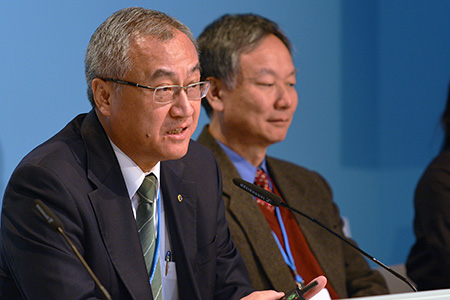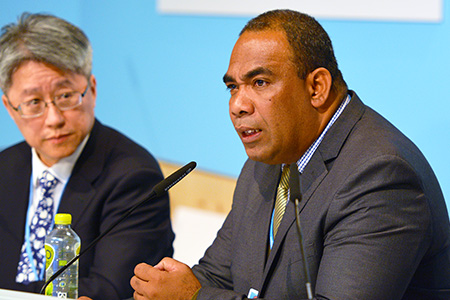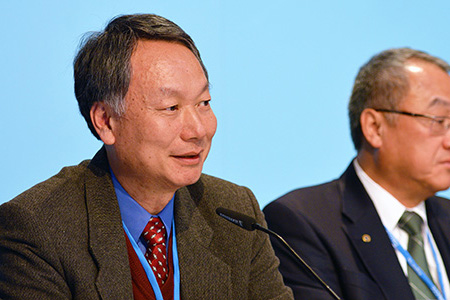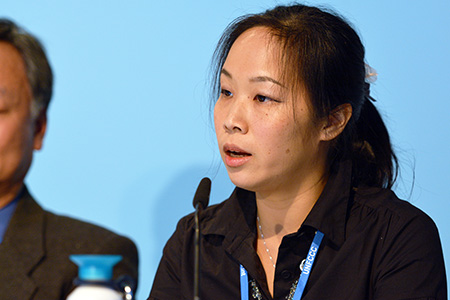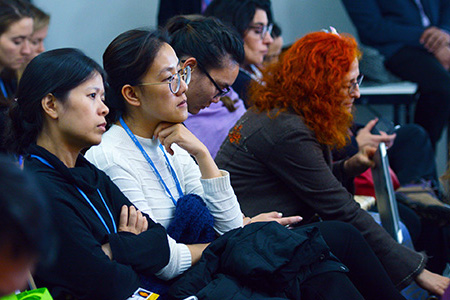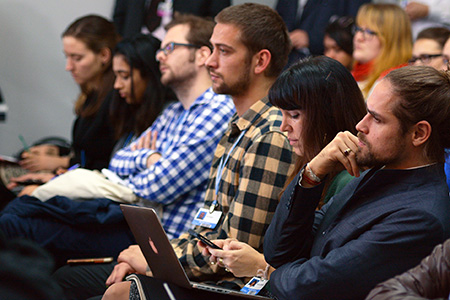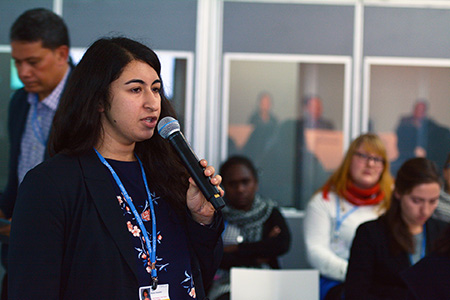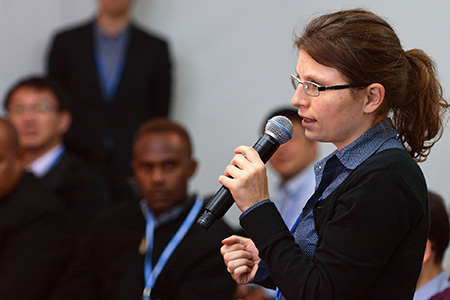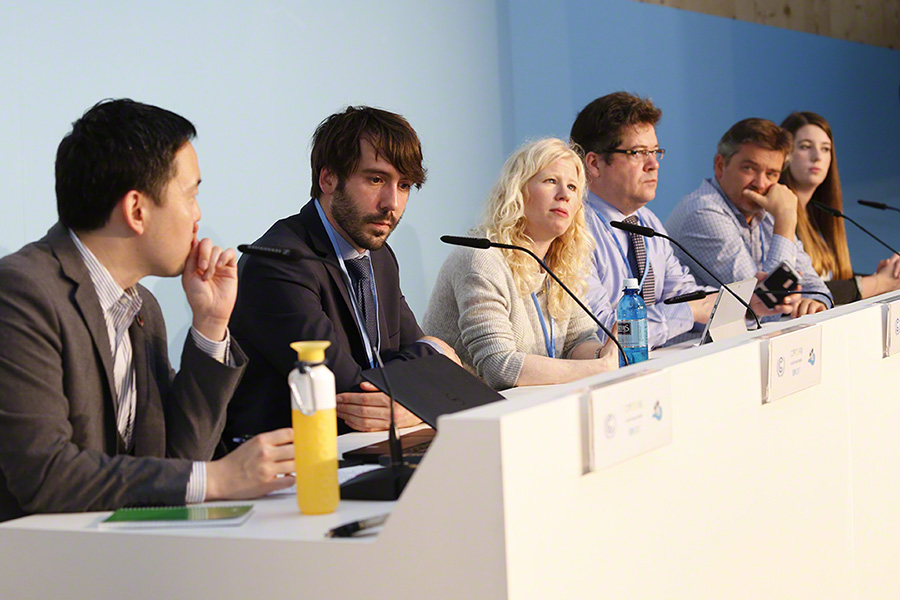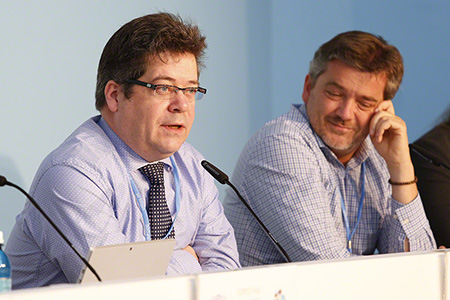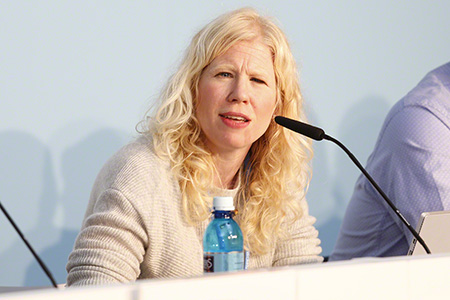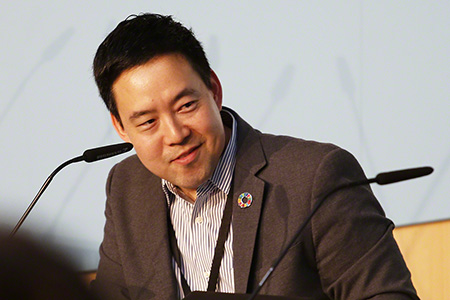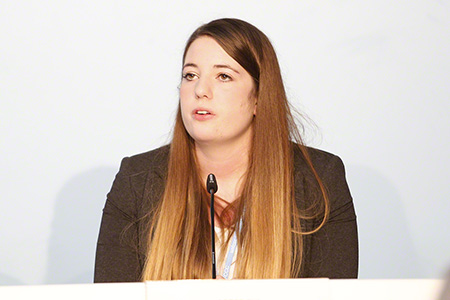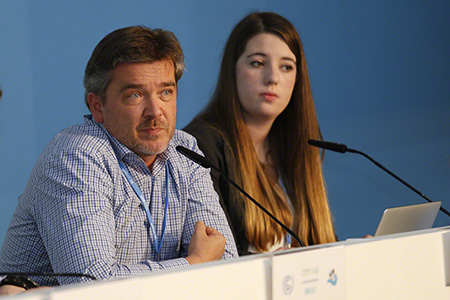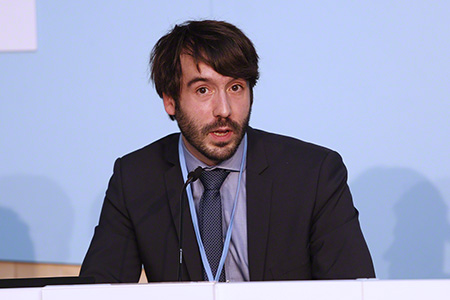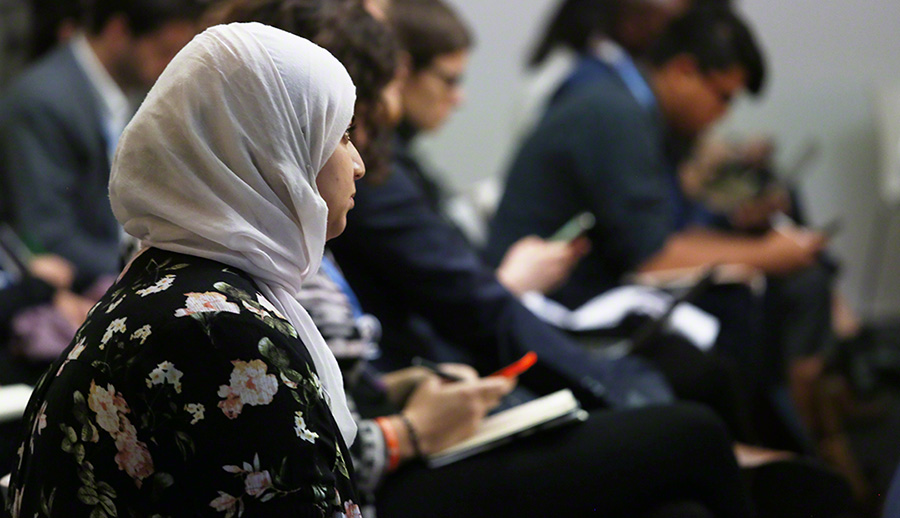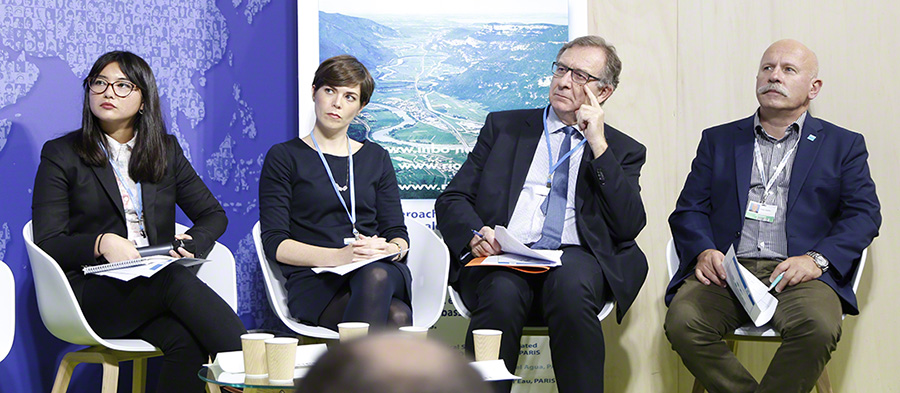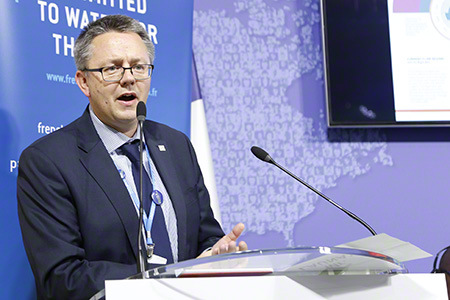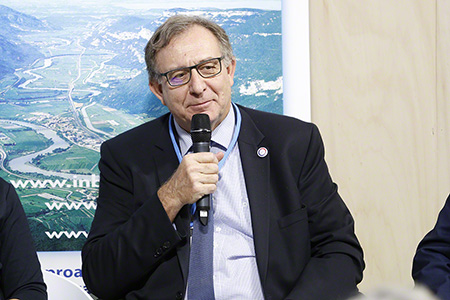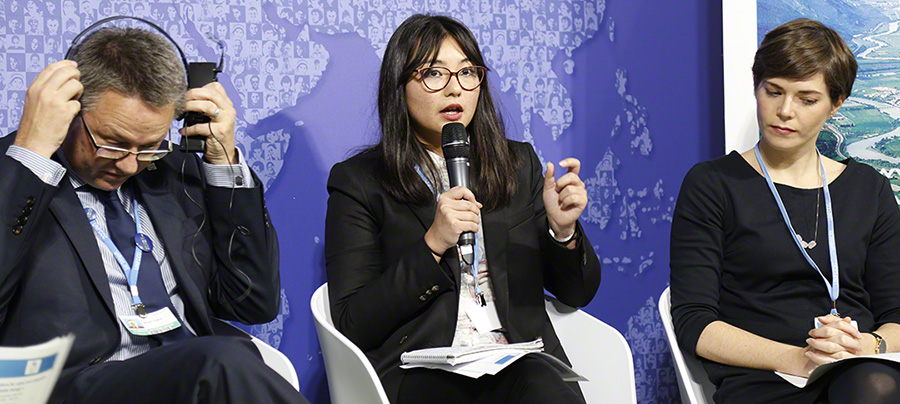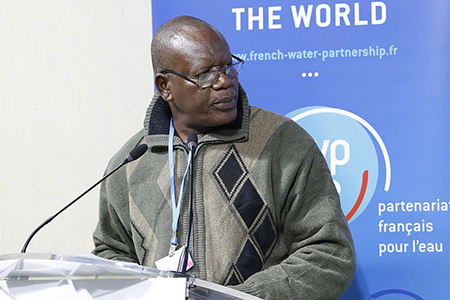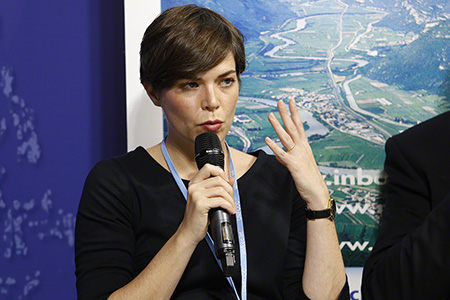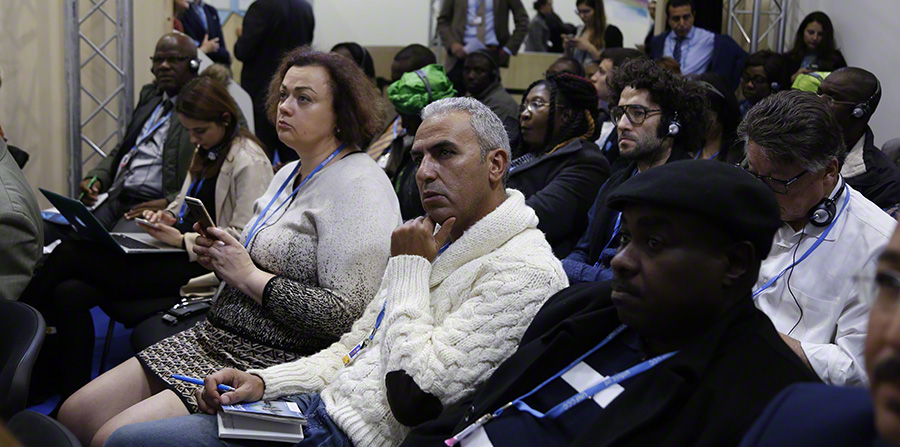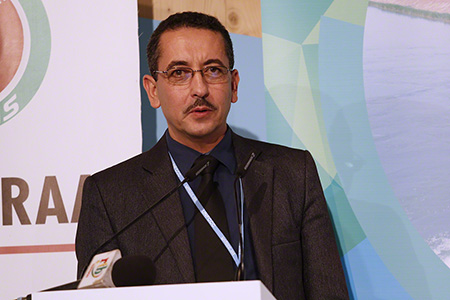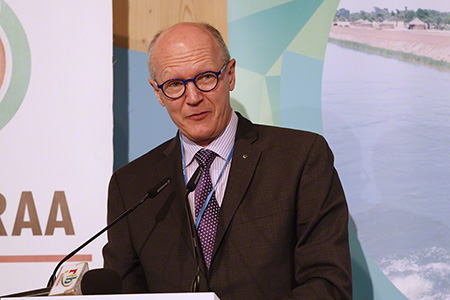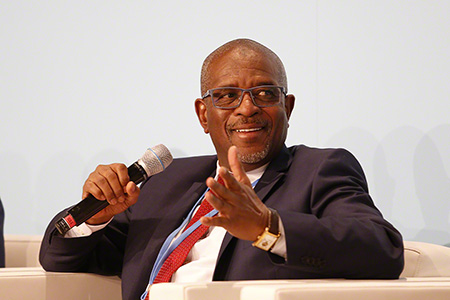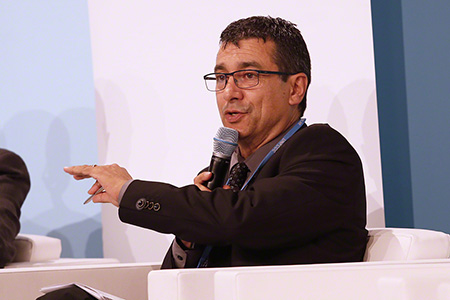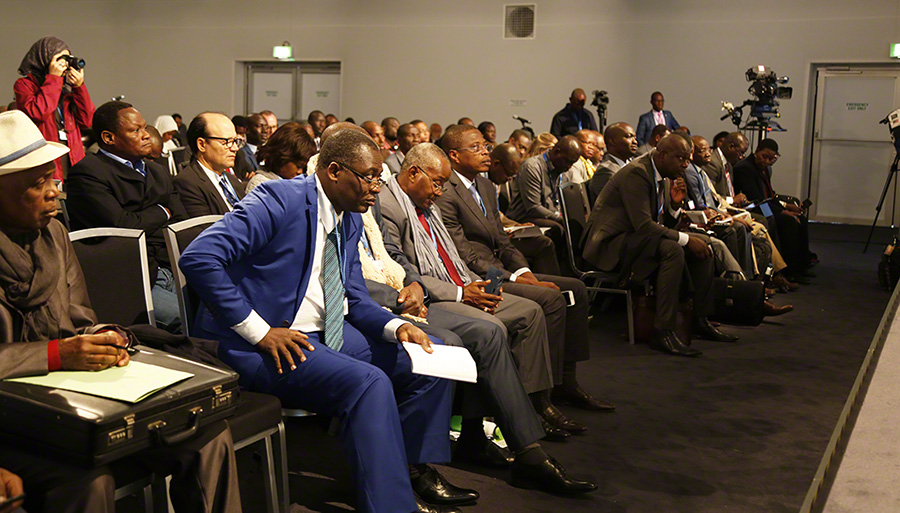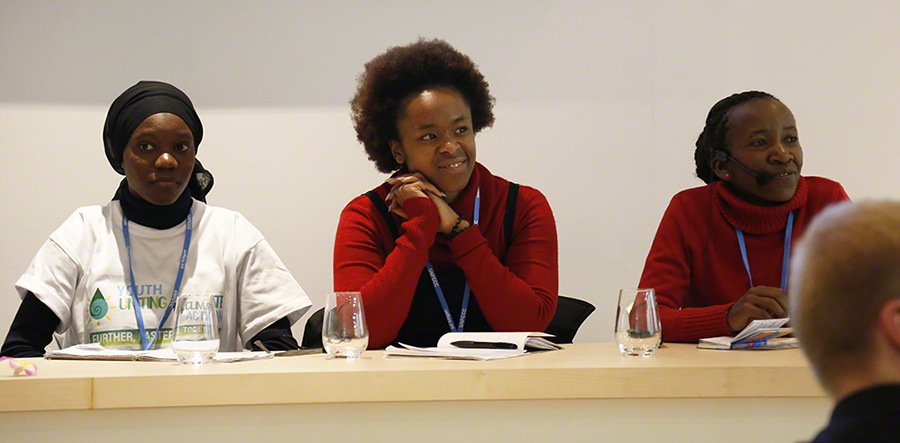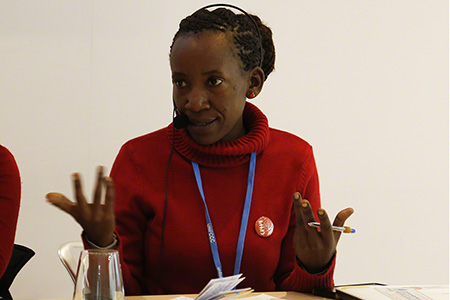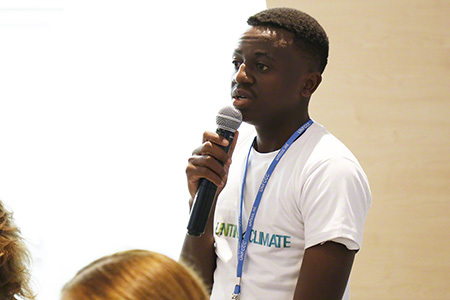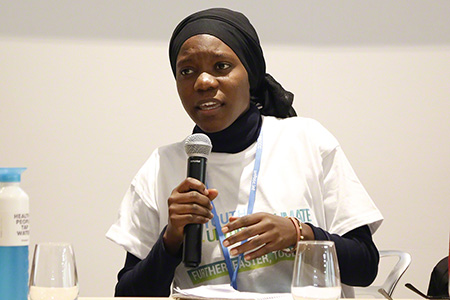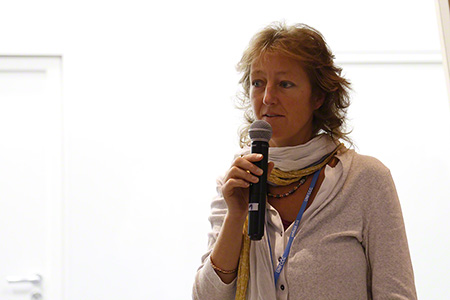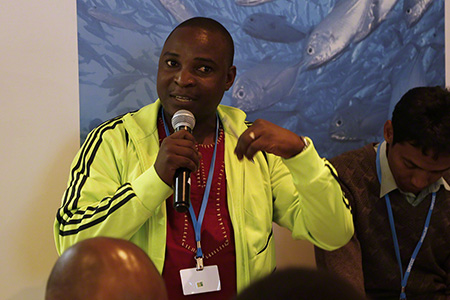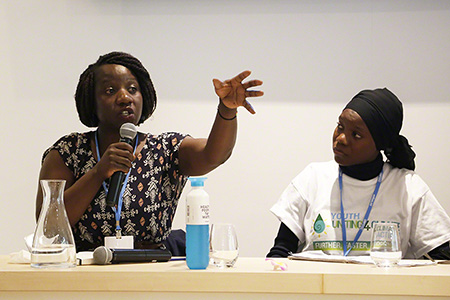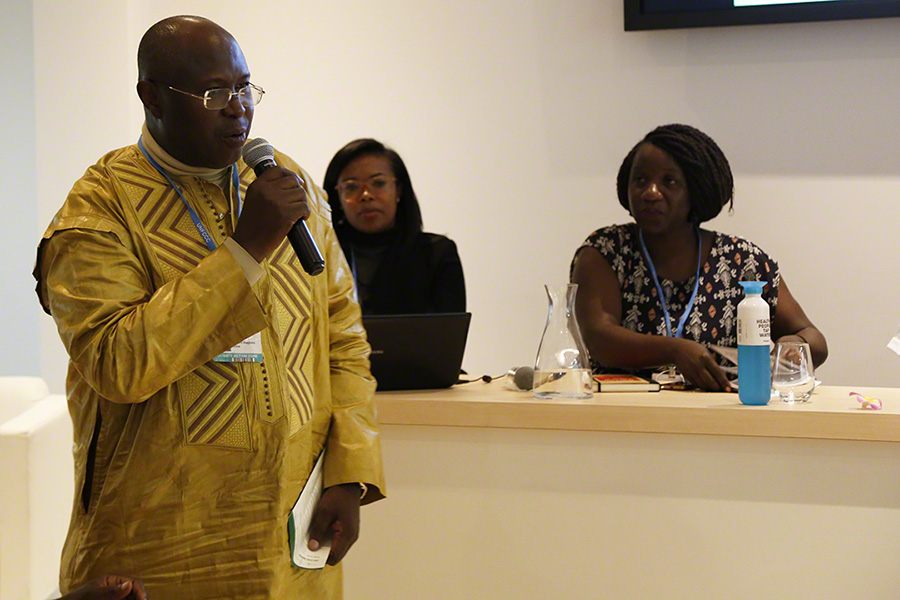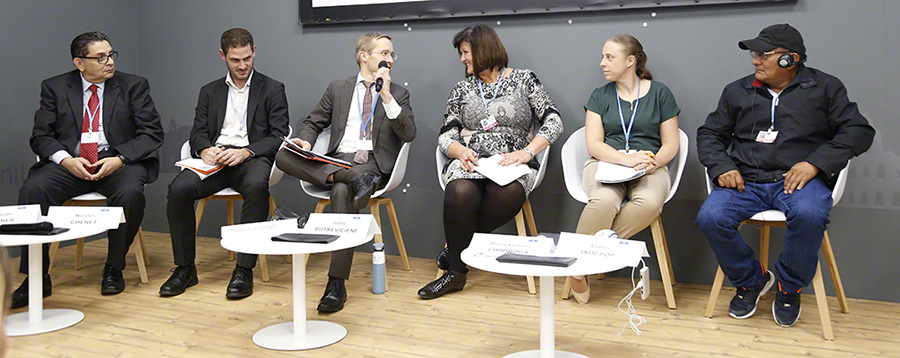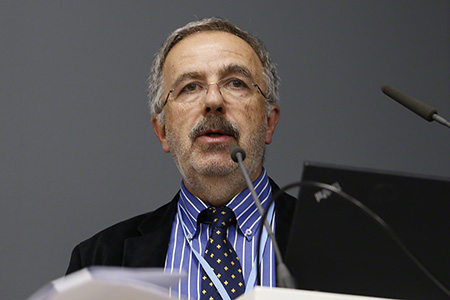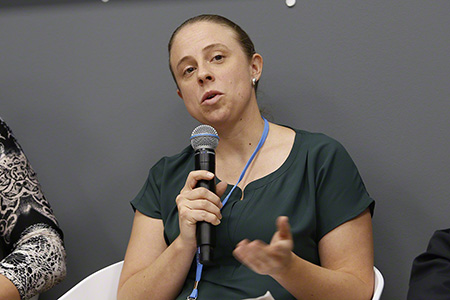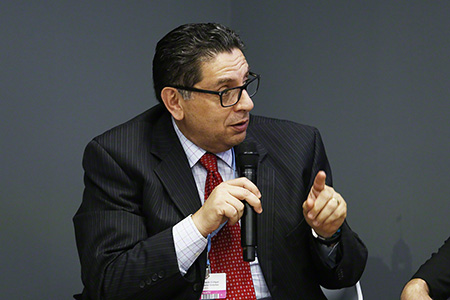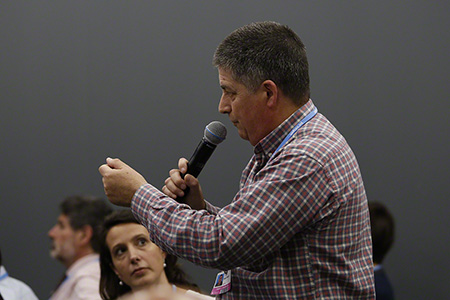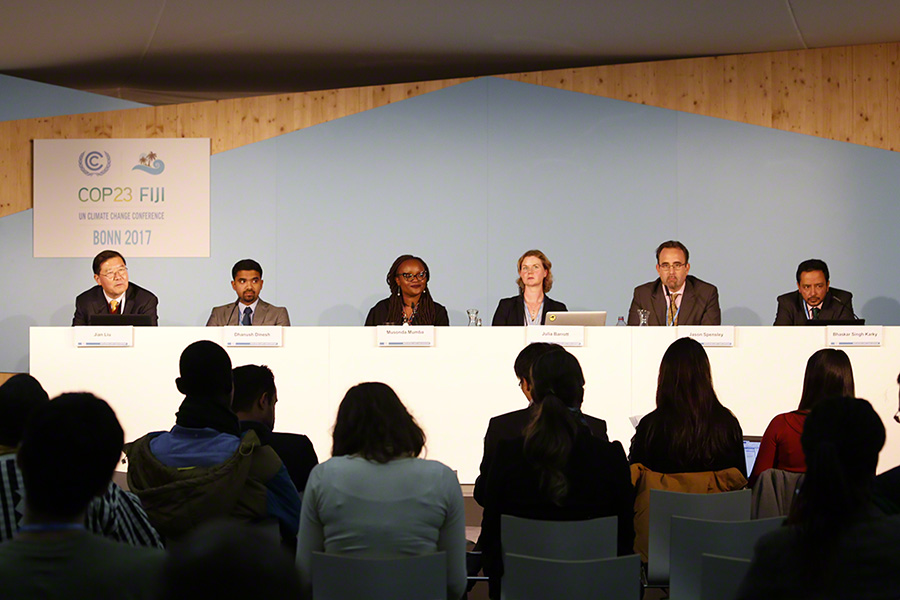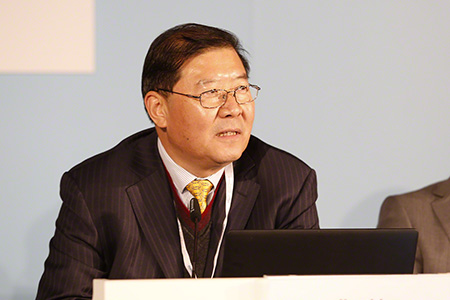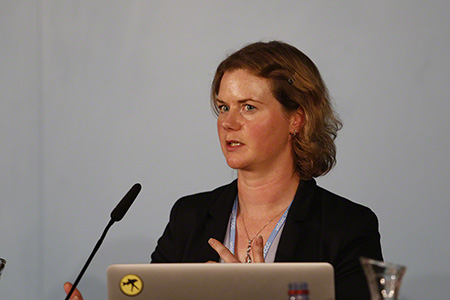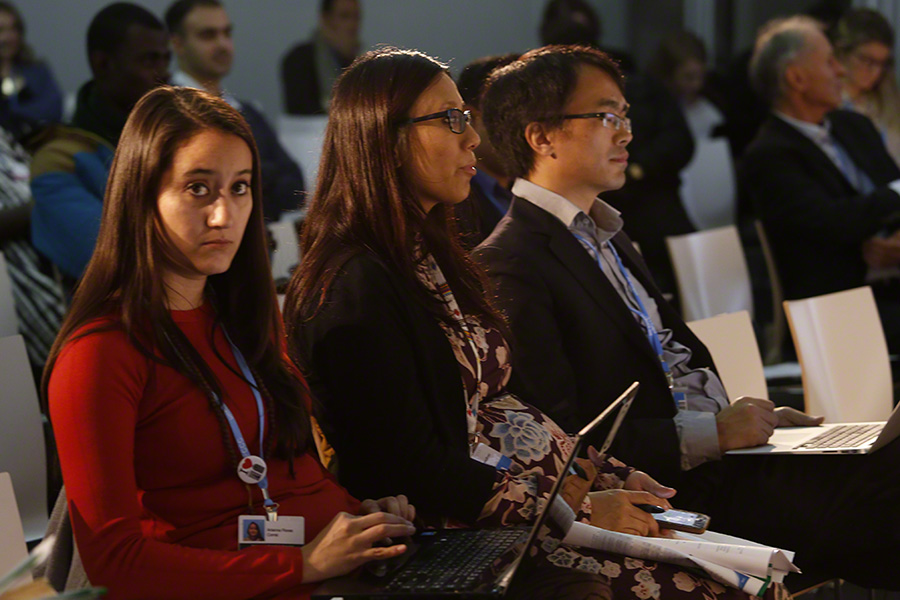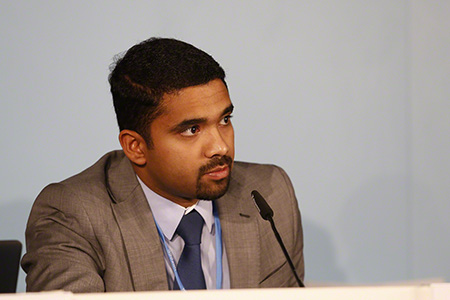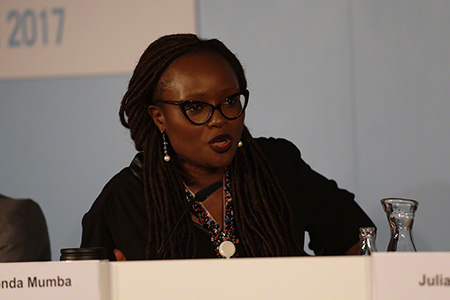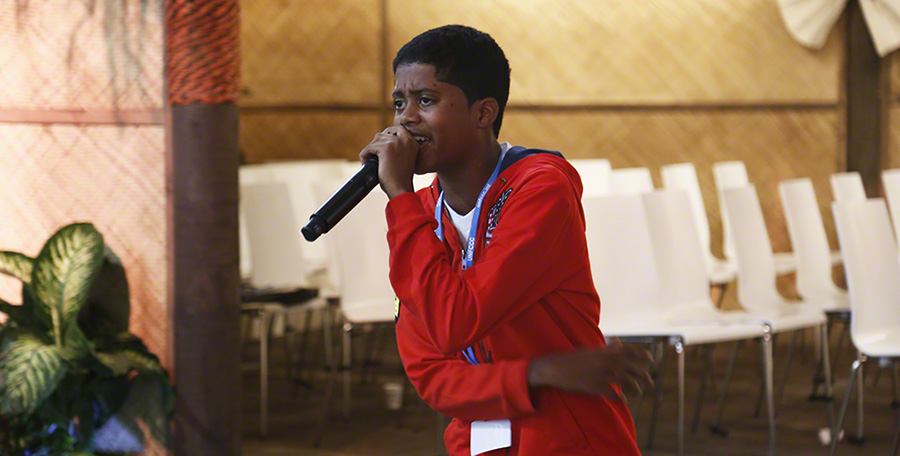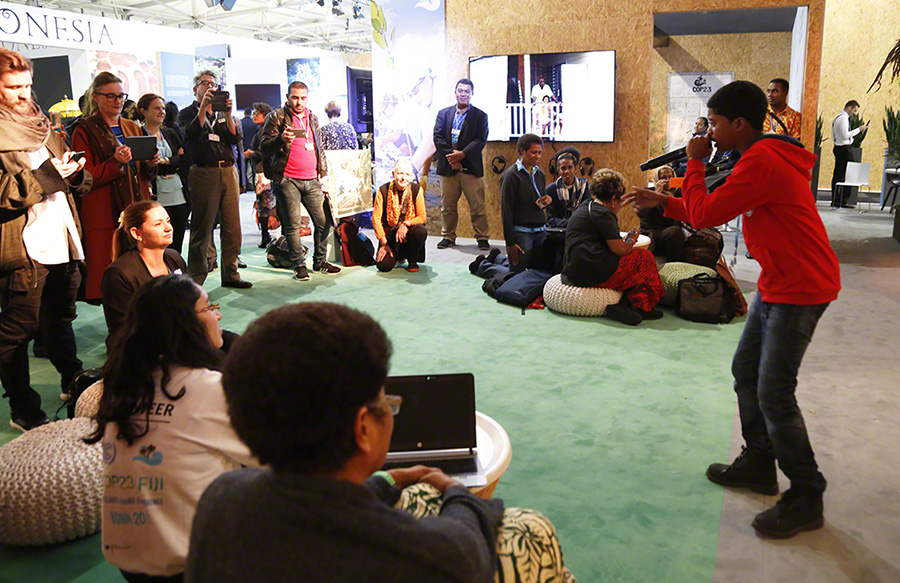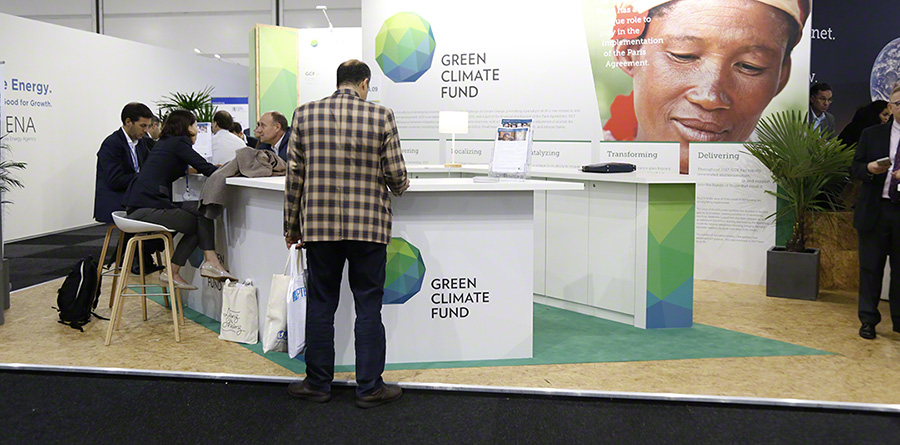Summary

The following events were covered by IISD Reporting Services On Thursday, 9 November 2017:
- Building Resilience for Climate Change Adaptation and Disaster Risk Reduction (DRR) in Vulnerable Islands
- Hacking Climate Change: The Digital Future of Climate Leadership, Innovation and Impact
- Nature-Based Solutions for Water and Adaptation to Climate Change
- Implementation of Nationally Determined Contributions (NDCs) in Countries: Progress, Challenges and Perspectives
- Harnessing Africa’s Emerging Youth Demographic for a Climate Resilient Future
- Enhancing the Resilience of Forests and Ecosystems to Achieve the Nationally Determined Contributions (NDCs) of Latin America
- Closing Knowledge Gaps to scale up Adaptation: Lima Adaptation Knowledge Initiative (LAKI)
IISD Reporting Services, through its Earth Negotiations Bulletin on the Side (ENBOTS) Meeting Coverage, will provide daily web coverage from selected side events at the UN Climate Change Conference - November 2017.
Photos by IISD/ENB | Ángeles Estrada and Herman Njoroge Chege
For photo reprint permissions, please follow instructions at our Attribution Regulations for Meeting Photo Usage Page.
Building Resilience for Climate Change Adaptation and Disaster Risk Reduction (DRR) in Vulnerable IslandsPresented by Solomon Islands and the Industrial Technology Research Institute (ITRI)
In this side event, panelists explored issues relating to DRR, climate change adaptation and building resilience in small island developing states (SIDS), through sharing experiences between the Solomon Islands and Taiwan. Chien-Te Fan, National Tsing Hua University, moderated the panel.
Melchior Mataki, Solomon Islands, noted lack of clear definitions of resilience, DRR and adaptation, saying that stakeholder groups conceptualized them differently. He emphasized the difficulty of separating development issues from climate adaptation and DRR in proving additionality for climate finance. Calling for “whole-of-government” and “whole-of-society” approaches, he said that partnerships and appropriate legislative and policy frameworks are indispensable to building resilience. He underscored the need to separate DRR from disaster management in policymaking, and reported on measures taken in his country and its associated challenges, including competing national priorities and lack of capacity, technology and financial resources.
Robert Yie-Zu Hu, ITRI, introduced his organization’s work on technology for renewable energy, energy efficiency and storage, the environment and smart buildings. He outlined Taiwan’s energy targets, including zero nuclear energy by 2030 and 20% renewable energy by 2025, saying that this is “not an easy job.” He explained Taiwan’s development strategies for solar and wind energy and noted innovations in: energy storage, which he said is a solution for variable and unpredictable renewable energy output; air-conditioning systems; and dye sensitized cells, which he said can generate solar energy in very low light.
Ming-Dean Cheng, Central Weather Bureau, Taiwan, presented on the Solomon Islands Synergistic Analysis for the Environment (SoSAFE), an early warning system for extreme weather events and earthquakes in the Solomon Islands. He said SoSAFE relies on automatic weather data stations, which collect good quality data despite a significant information gap. He also outlined a project to predict epidemics of dengue fever.
Mei-Yu Chang, Ministry of Science and Technology, Taiwan, presenting on disaster response and risk management in her country, outlined an increase in extreme weather events in Taiwan over the last decade, including tropical cyclones, flooding, droughts, landslides and typhoons. She said Taiwan has high exposure and vulnerability to natural disasters due to its concentrated urban population, increasing elderly population and complex geographical factors. Outlining Taiwan’s central emergency response system, she shared examples of its applications that provide flood warnings, produce hazard maps for landslides, communicate information to the public, and evacuate houses during typhoons.
L-R: Chien-Te Fan, National Tsing Hua University; Melchior Mataki, the Solomon Islands; Robert Yie-Zu Hu, ITRI; Ming-Dean Cheng, Central Weather Bureau, Taiwan; and Mei-Yu Chang, Ministry of Science and Technology, Taiwan
Robert Yie-Zu Hu, ITRI, spoke about his organization’s experience in international solar energy development.
Melchior Mataki, Solomon Islands, shared experiences from his country’s work in building resilience to climate change and DRR.
Ming-Dean Cheng, Central Weather Bureau, Taiwan, said the Solomon Islands faces threats from earthquakes, tsunamis, cyclones, and flooding.
Mei-Yu Chang, Ministry of Science and Technology, Taiwan, highlighted lessons learned from her country’s disaster early warning system.
Contact:
- Chanel Iroi (Solomon Islands) | c.iroi@met.gov.sb
Wen-Cheng Hu (ITRI) | vincenthu@itri.org.tw
More Information:
Hacking Climate Change: The Digital Future of Climate Leadership, Innovation and ImpactPresented by Microsoft and the South Pole Group
This event, moderated by David Wei, Business for Social Responsibility (BSR), focused on new technological innovations, and the leadership and regulation required to maximize opportunities for growth in the digital and telecommunications sector. Wei said the time has arrived for putting the pledges and Nationally Determined Contributions (NDCs) into implementable strategies that will inspire future enhancement of innovation.
Ingo Puhl, South Pole Group, gave the example of horse manure crisis in the 19th century in New York City, which became irrelevant in the 20th century due to transport innovation, to suggest that innovation is driven primarily by technological desirability, such as electric cars and smartphones.
Victor Gancel, Climate-KIC, presented the objectives behind city-wide atmospheric monitoring, reporting and verification (MRV) assessments piloted in Paris, Rotterdam and Recife, including to: enable comparability and consistency in greenhouse gas (GHG) inventories; combine bottom-up inventories with GHG concentration measurements; and enable more accurate inventories that are updated more frequently.
Leonie Klaas, Telefónica Germany NEXT GmbH, described her organization’s strategies to use anonymous communication data to provide information about modes of transportation and thus calculate specific emission factors for each mode. She said the value of this technology is that it can track GHG emission levels hourly, enables cities to identify “emission hot spots,” and provides comparatively rapid sources of data on air pollution.
Jan-Willem van der Veen, European Bank for Reconstruction and Development (EBRD), outlined lessons from the Clean Development Mechanism (CDM), including that it should respond with payment in a timely manner and calculate the cost of monitoring appropriately. He lamented that negotiators are often not aware of the smart technologies available and tend to work within a rule-based environment where little space for innovation exists.
Michelle Patron, Microsoft, spoke about the potential of new technological innovations to empower people in remote areas to improve their livelihoods and knowledge. She suggested new innovation, paired with human ingenuity, has unlimited potential in the current era of digital transformation to address resource deficiencies and impacts on the planet.
Panelists responded to questions from the floor on the role of the private sector and the ethics behind technological innovations, with Patron stressing the need to talk to local communities before making big decisions.
L-R: David Wei, BSR; Victor Gancel, Climate-KIC; Michelle Patron, Microsoft; Jan-Willem van der Veen, EBRD; Ingo Puhl, South Pole Group; and Leonie Klaas, Telefónica Germany NEXT GmbH
Jan-Willem van der Veen, EBRD, urged accelerating information technology tools that can speed up financial application processes.
Michelle Patron, Microsoft, challenged participants to “think beyond their own four walls” and imagine the development possible in the digital transformation era.
Moderator David Wei, BSR, stressed the importance of using technology to implement the Paris Agreement.
Leonie Klaas, Telefónica Germany NEXT GmbH, emphasized the need for developing technologies that can assist cities to address and take effective action against air pollution and carbon emissions.
Ingo Puhl, South Pole Group, called for policies to foster faster adoption of new technologies that address climate challenges.
Victor Gancel, Climate-KIC, envisaged development of a global MRV map of emissions in the next decade.
Contact:
- Michelle Lancaster (Microsoft) | milanca@microsoft.com
More Information:
Nature-Based Solutions for Water and Adaptation to Climate ChangePresented by the French Water Partnership (FWP) and the International Network of Basin Organizations (INBO)
This session, moderated by Maylis Castaignet, Seine Normandy Partnership, centered on the role of nature-based solutions for water and adaptation to climate change focusing on the interlinkages of water, biodiversity and climate change.
Jean Launay, President, French Water Partnership, recalled the UN resolution establishing the ‘International Decade for Action, Water for Sustainable Development 2018-2028’ in support of Sustainable Development Goal 6 (SDG 6) which, inter alia, addresses integrated management of water resources. He noted the strategic importance of 2018, when the Decade will start.
In a keynote speech, James Dalton, International Union for Conservation of Nature (IUCN), spoke on the work of his organization related to nature-based solutions. He said that for over 70 years, IUCN has been committed to protecting the environment and stressed the human dependency on healthy ecosystems. Dalton noted major transboundary benefits of functional habitats and recalled that water is not mentioned in the Paris Agreement, suggesting COP 23 focus more on this issue. He added that policy frameworks exist but poor communication and institutional weaknesses remain key challenges for mainstreaming solutions on sustainable development.
Aurélie Lhume, UN Convention to Combat Desertification (UNCCD), highlighted the links between the SDGs, water and land protection. She defended multisector approaches to tackle water issues, saying that political reforms to improve water management are urgently needed. Lhume concluded that the water deficit requires political will and larger investments from all countries. On land degradation and drought, she said that the UNCCD is developing new tools to support parties to identify implementation gaps.
Tobias Salathé, Ramsar Convention on Wetlands, spoke on tools to protect wetlands, saying that they were identified as vulnerable areas in the 1960s. He stressed that, since 1971, the world loses 1% of wetlands yearly, emphasizing the importance of wetlands as carbon sinks and water reservoirs.
Jean-Luc François, French Development Agency (AFD), highlighted the economic trajectory of our societies, which has affected nature dangerously, and called for reviewing economic and investment models to reverse the current unsuitable patterns of development. He emphasized the role of development agencies to positively influence more sustainable development patterns.
Adama Doulkom, Great Green Wall Initiative for the Sahara and the Sahel (IGMVSS), Burkina Faso, provided the background of his initiative, noting the similarities between the challenges faced by countries suffering from drought. He explained that the exchange of best practices among IGMVSS member countries stimulated regional solutions, noting productivity gains after ecosystems were restored. He called for better synergies in Africa and recommended focusing on better practices regarding tenure security.
During concluding remarks, Jean-François Donzier, Executive Secretary, Alliance for Global Water Adaptation (Alliance4Water), called on the audience to “act” and declared that mobilization and implementation of known solutions is the most important response to dangerous nature degradation. He closed the meeting, inviting participants to sign the International Declaration on “Nature-Based Solutions for Water Management Under Climate Change,” to be presented on 10 November at COP 23.
In the ensuing debate, participants discussed, inter alia, traditional knowledge and the role of farmers in the promotion of nature-based solutions; methods to share best practices; and links between oceans and climate change.
L-R: Maylis Castaignet, Seine Normandy Partnership; Jean Launay, President, FWP; Aurélie Lhume, UNCCD; Jean-Luc François, AFD; and Tobias Salathe, Ramsar Convention on Wetlands
James Dalton, IUCN, underscored the need to translate natural solutions into engineering actions.
Jean-Luc François, AFD, said nature is a victim of our current development models.
Maylis Castaignet, Seine Normandy Partnership, moderated the session.
Adama Doulkom, IGMVSS, noted high costs of climate inaction for vulnerable countries.
Aurélie Lhume, UNCCD, noted agroforestry and restoration of basins as valuable nature-based solutions.
Contact:
-
Edouard Boinet (INBO) | e.boinet@inbo-news.org
Solène Fabrèges (FWP) | solene.fabreges@partenariat-francais-eau.fr
More Information:
Implementation of Nationally Determined Contributions (NDCs) in Countries: Progress, Challenges and PerspectivesPresented by Comité Permanent Inter-états de Lutte contre la Sécheresse au Sahel (CILSS); Economic Community of West African States (ECOWAS), Organisation Internationale de la Francophonie (OIF/IFDD), and Union Economique et Monétaire Ouest Africaine (UEMOA)
In this side event, panelists explored the implementation of NDCs in francophone Africa subregions. Kamal Djemouai, African Group of Negotiations (AGN), and Stéphane Pouffary, ENERGIES 2050 co-moderated the session. Djemouai, introduced the event and called for realistic action to mitigate climate change for future generations.
Abdallah Boureima, UEMOA, explained the relationship between his organization and ECOWAS in the West African region, including in working towards NDC development and implementation. He highlighted initiatives developed through international cooperation, including: addressing vulnerability in agriculture; controlling erosion; forest management; and energy development. He noted that these target rural individuals, who feel the effects of climate change daily.
Djimé Adoum, CILSS, referring to the Paris Agreement as a base for climate action, added that consensus and harmonized views were also necessary. He called for dialogue among experts, particularly on Article 6 of the Paris Agreement, and added that finance is necessary to ensure effective action. Urging for better techniques to adapt to climate change, he drew attention to those created by his organization that would be of use to member states in their NDCs, such as a mapping tool to design and plan good land management.
Bernard Dubois, IFDD, highlighted the role of his organization in supporting countries within francophone Africa to implement their NDCs. Noting country-specificities, he called for data, financial support and capacity building to address gaps, in order to implement NDCs. He urged for French to become a more widely-used working language in negotiations.
During the discussion, panelists engaged in a dialogue on: financial mechanisms necessary to implement NDCs; key actors and actions in long-term strategies; energy alternatives in Africa; the future trajectory of capacity building in francophone West Africa; and how West African countries that already have national action plans can be an example for the others.
Hussein Alfa Nafo, Chair of AGN, closed the session, and called for a strategy to synergize experience sharing within West Africa and abroad.
Kamal Djemouai, AGN, said “we need to move together and act quickly.”
Bernard Dubois, IFDD, said “we can go further in providing capacity building to break down language barriers.”
Abdallah Boureima, UEMOA, explained “we must help West African states in the negotiation process to defend the interests of the region.”
Stéphane Pouffary, ENERGIES 2050, posed questions to the panelists on financial mechanisms and long-term strategies to NDCs.
Audience members lean in to the discussion.
Contact:
- Arona Soumare (IFDD) | arona.soumare@francophonie.org
More Information:
Harnessing Africa’s Emerging Youth Demographic for a Climate Resilient FuturePresented by South African Institute of International Affairs (SAIIA)
In this side event, panelists explored the role and potential of African youth in addressing climate change. Sylvia Namukasa, Kirinda Youth Environmental Management and Poverty Alleviation Program (KYEMPAPU), Uganda, moderated the panel.
Ditebogo Lebea, SAIIA, said that 65% of Africa’s population are children and youth aged 24 or younger, and that by 2030 a third of the global population will be African. She called for greater African youth participation in UNFCCC processes, saying that the COP is making decisions about African youth without them being present, and noted intersections between climate change, education and health in South Africa.
Awa Njie, University of the Gambia, noted climate impacts on her country, including adverse effects on subsistence agriculture and biodiversity. She called for increased youth participation in decision-making, noting in particular the need for capacity-building programs to empower the youth, increased funding for Global South youth delegates, and a seat at the table rather than observer status.
Maureen Sigauke, Green Active Citizens, called for harnessing the youth demographic to achieve a climate-resilient future for Africa. Sharing her organization’s experiences in participating in the formulation of national climate policy, she said that all governments should bring young people to the table on climate change decision-making. She noted challenges for youth engagement, including the mobility of African youth and the need for climate finance; and called for increased collaboration amongst the youth and fulfilment of climate finance pledges.
Katia Mahery Rakotonirina, Maharitra, presented on youth projects in Madagascar, including on plastic bag use, biogas renewable energy, a zero-waste festival, and a climate change conference. She noted barriers such as a lack of youth interest, the need for capacity building, and a lack of coordination between youth groups in different parts of the country. She suggested developing a networking platform for youth in her country.
Manuel Pulgar-Vidal, WWF, highlighted the need to include youth in climate solutions, saying that “we are working for the next generation.” He called for: “connecting the dots” between climate change and other environmental and social issues; making the adaptation agenda more relevant; and developing better adaptation indicators.
L-R: Awa Njie, University of the Gambia; Ditebogo Lebea, SAIIA; and Sylvia Namukasa, KYEMPAPU, Uganda
Sylvia Namukasa, KYEMPAPU, highlighted the benefits of African youth participation in climate action.
Participants asked questions during the event
Awa Njie, University of the Gambia, Gambia, said African youth "are vital and we serve as a catalyst in combatting climate change.”
Maureen Sigauke, Green Active Citizens, said African youth have the “ideas, drive, and potential” to address climate change.
L-R: Katia Mahery Rakotonirina, ONG Maharitra; Maureen Sigauke, Green Active Citizens; Awa Njie, University of the Gambia; Ditebogo Lebea, SAIIA; and Sylvia Namukasa, KYEMPAPU, Uganda
Contact:
-
Durrel Halleson (WWF) | dhalleson@wwfcam.org
More Information:
Enhancing the Resilience of Forests and Ecosystems to Achieve the Nationally Determined
Contributions (NDCs) of Latin AmericaPresented by EUROCLIMA+, funded by the EU
This session, moderated by Roberto Canessa, EUROCLIMA+, focused on the relevance of climate-resilient forests, ecosystems and local communities’ livelihoods in the context of NDC implementation in Latin America.
Jolita Butkeviciene, European Commission, noted the cooperation between the EU and Latin America on forests, highlighting European financial support of climate action. She said EUR80 million, with contributions by the French and German governments, are dedicated to support NDCs in Latin America, adding that 16 NDCs in this region include forestry.
Martin Kipping, German Ministry for Economic Cooperation and Development (BMZ), noted the German contribution of EUR2 billion to ongoing forest projects worldwide, highlighting the Amazon basin as the most relevant recipient region. He emphasized the need to merge climate and development policies, and encouraged multi-stakeholder engagement at the country level.
María Victoria Chiriboga, Ecuador, emphasized her country’s strategies to tackle deforestation, noting the creation of refined environmental and social safeguards. She called for the integration of mitigation and adaptation measures into one single strategy, lamenting the excess of attention paid to mitigation only. She praised the significant “voices” of Latin American countries within the EUROCLIMA+ decision-making bodies, calling them a model of governance for international cooperation.
Andrés Ixim Pop, representing an indigenous organization from Petén, Guatemala, recalled the trajectory of the Maya people, saying the causes of deforestation in his country largely relate to intensive agriculture. He recalled the spiritual values of biodiversity and lamented that asymmetries in power relations continue to promote nature degradation.
Orlando Garner, Honduras, recalled the devastating effects of hurricanes and added that 2015-2016 marked a period of extreme droughts in his country. He noted that this problem caused a six-fold increase in beetles, which destroyed about one-quarter of the country's primary forest cover. He called for investments in youth environmental education to ensure long-term sustainable development strategies.
Nicolas Chenet, Expertise France, announced a project of EUR7 million selecting reforestation projects in Latin America under the EUROCLIMA+ programme, including innovation, replicability, inclusiveness, and synergies between local and national policies, as well as local communities’ involvement and co-financing at a rate higher than 20%.
In the ensuing discussion, participants discussed, inter alia, the role of civil society in NDC implementation; financial barriers for reforestation; land rights of indigenous peoples; contradictions between local and national policies; and environmental literacy.
L-R: Orlando Garner, Honduras; Nicolas Chenet, Expertise France; Martin Kipping, BMZ; Jolita Butkeviciene, European Commission; María Victoria Chiriboga, Ecuador; and Andrés Ixim Pop, representing an indigenous organization from Petén, Guatemala
Roberto Canessa, EUROCLIMA+, moderated the session.
María Victoria Chiriboga, Ecuador, explained that deforestation reductions of only 1,49% can already make a difference in terms of greenhouse gas reductions.
Orlando Garner, Honduras, recalled the devastating effects of plagues in Honduras’ forests following extreme droughts.
Contact:
- Roberto Canessa (EUROCLIMA+) | roberto.canessa@euroclima.org
More Information:
Closing Knowledge Gaps to scale up Adaptation: Lima Adaptation Knowledge Initiative (LAKI)Presented by UN Framework Convention on Climate Change (UNFCCC) Secretariat and UN Environment
In this side event, moderated by Musonda Mumba, UN Environment, panelists discussed using LAKI to close adaptation gaps. Youssef Nassef, UNFCCC Secretariat, introduced the session and the LAKI, which is designed to address knowledge gaps impeding the successful scaling up of adaptation, and is applied at the subregional level.
Barney Dickson, UN Environment, noted that his organization, launched its third Adaptation Gap Report on measuring adaptation gaps, which he explained, must be narrowed. In regards to implementing LAKI, he noted good practices, including the partnership between his organization and the UNFCCC Secretariat, working at the subregional level, and engaging with local partners. In terms of areas for improvement, he highlighted a need to catalyze action to fill the gaps, and to address this, he suggested linking LAKI to National Adaptation Plans (NAPs).
Bhaskar Singh Karky, International Centre for Integrated Mountain Development (ICIMOD), shared his organization’s experience implementing LAKI in the Hindu Kush Himalaya region. In observing that national data does not always reflect the entire country, he noted that LAKI facilitated the identification of challenges through its subregional approach. He emphasized the need for a multi-stakeholder approach in addressing climate adaptation.
Julia Barrott, Stockholm Environment Institute (SEI), explained that her organization can fill knowledge gaps through capacity building and technical support, including through its tools. She highlighted weADAPT, which is an open global online knowledge sharing platform that supports actionable and peer-to-peer learning. She said that LAKI is a starting point to identify improvements, noting that lack of access to existing tools is the main problem, not lack of capacity.
Dhanush Dinesh, Consultative Group on International Agricultural Research (CGIAR), noted that his organization can add value as a research institute, particularly through cross-cutting research initiatives such as the CGIAR Research Program on Climate Change, Agriculture and Food Security. He explained that it engages with multiple UNFCCC processes, including through supplementing technical guidelines of NAPs and nationally determined contributions (NDCs). He urged addressing gender barriers in accessing climate information.
Jason Spensley, Green Climate Fund (GCF), highlighted lessons learned from an NAP development financing initiative led by his organization. He noted good practices from its application process, and called on parties to specify knowledge gaps first in order to develop plans to address them. He underscored that tools and technology are barriers to unlocking adaptation financing.
Jian Liu, UN Environment, referred to the World Adaptation Science Programme (PROVIA) led by his organization, which works with the research community to fill knowledge gaps in adaptation, and work for people on the ground and at the policy level. He explained that communication is key, particularly in translating technical information to practitioners and decision-makers.
During the ensuing discussion, participants addressed, among others: the potential to use an ecosystem-based rather than a subregional approach, and to focus on climatic hotspots, such as semi-arid lands and river deltas; the role of traditional knowledge in LAKI; capitalizing on existing local capacities; using agriculture extension officers as change agents; specific tools or challenges to disseminate knowledge; the role of social science in adaptation; and how LAKI examines political economy across subregions.
L-R: Jian Liu, UN Environment; Dhanush Dinesh, CGIAR; Musonda Mumba, UN Environment; Julia Barrott, SEI; Jason Spensley, GCF; and Bhaskar Singh Karky, ICIMOD
Jian Liu, UN Environment, said we need to bridge the science policy interface and make it work for the people.
Julia Barrott, SEI, said her organization can fill gaps in adaptation knowledge.
Participants used sli.do, an online platform, to pose questions to the panel.
Dhanush Dinesh, CGIAR, said there are gender barriers to accessing climate information.
Musonda Mumba, UN Environment, encouraged panelists to discuss the opportunities and challenges of closing knowledge gaps in adaptation.
Contact:
-
Rojina Manandhar (UNFCCC Secretariat) | rmanandhar@unfccc.int
More Information:
Around the Venue
About
| 6 Nov
| 7 Nov
| 8 Nov
| 9 Nov
| 10 Nov
| 11 Nov
| 13 Nov
| 14 Nov
| 15 Nov
| 16 Nov
| 17 Nov
The Earth Negotiations Bulletin on the Side (ENBOTS) © enb@iisd.org is a special publication of the International Institute for Sustainable Development (IISD). This issue has been written by Suzi Malan, Nicole de Paula, Ph.D., Kelly Sharp, and Natalie Jones. The Digital Editor is Ángeles Estrada. The Editor is Leila Mead leila@iisd.org. The Director of IISD Reporting Services is Langston James “Kimo” Goree VI kimo@iisd.org. The opinions expressed in ENBOTS are those of the authors and do not necessarily reflect the views of IISD and funders. Excerpts from ENBOTS may be used in non-commercial publications only with appropriate academic citation. For permission to use this material in commercial publications, contact the Director of IISD Reporting Services at kimo@iisd.org. Electronic versions of issues of ENBOTS from the UN Climate Change Conference 2017, can be found on the IISD Reporting Services website at http://enb.iisd.org/climate/cop23/enbots/. The ENBOTS Team at the the UN Climate Change Conference 2017, can be contacted by e-mail at suzi@iisd.org.

